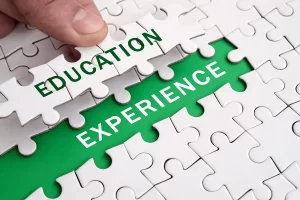Are you debating whether to list your education or experience first on resume? Well, you are not alone. Many job applicants aren’t sure which one they should highlight first. In reality, however, the answer simply lies in learning how to identify the information that they need to include on their resume. Is this unfamiliar to you as well?
Don’t worry; in this article, we’ll look at different approaches in presenting your education and work history in your application tool. We will also talk about whether to place your education or experience first on resume. Read on.
Benefits of the Education Section on Your Resume
Having a strong educational background can significantly enhance your profile and give you a competitive edge over other applicants. This is because employers often use educational credentials as a quick way to gauge a candidate’s level of expertise.
But apart from these, here are other compelling reasons the education section remains a critical component of your resume:
It helps you establish your credentials and credibility.
Employers often view formal education as a reliable indicator of your commitment to personal and professional growth. So whether it’s a degree, certification, or specialized training, your educational achievements instill credibility in your technical skills and capabilities. With these in mind, you need to showcase your educational achievements prominently on your resume to increase your chances of landing your desired job opportunities.
Your degree suggests useful knowledge and abilities in addition to academic achievement.
Recruiters sometimes view education as additional work experience, especially if the coursework fits the job specifications. By displaying your degree, you communicate right away your fundamental understanding of your field, which increases your value and strengthens your candidacy.
It serves as a testament to your dedication and long-term investment in your career.
Your education section showcases your willingness to devote years to mastering your chosen field, highlighting your work ethic and commitment to professional growth. Most recruiters value candidates who exhibit a willingness to go the extra mile as exemplified by the pursuit of higher education. This means that your educational background not only validates your expertise but also underscores your suitability for the role and organizational culture.

Benefits of the Work Experience Section on Your Resume
Similar to the education section, the experience area is also an essential component of any candidate’s application tool. This section serves as the cornerstone of your resume that gives prospective employers a glimpse into your accomplishments, abilities, and career path. Moreover, your resume work experience plays a pivotal role for several key reasons.
It showcases your expertise, transferable skills, and accomplishments to potential employers.
Employers look for specific skills and experiences that align with the requirements of the job they’re offering. By detailing your experience section with your skills and accomplishments in each role, you can present your expertise and impact within previous positions. This can give prospective employers tangible evidence of your value and potential contributions to their organization.
It demonstrates your career progression and growth within your chosen field.
Aside from highlighting your relevant experience, your resume experience also provides a clear picture of your career trajectory, which demonstrates growth, increasing responsibility, and skills development over time. This progression can indicate your potential for future success in a new role.
It effectively underscores your experience relevant to your target role or field.
Tailoring your work history to the specific job you’re applying for allows you to emphasize experiences most relevant to the position. This customized approach increases your chances of catching the employer’s attention and being considered for the role.
Deciding When to Put Education or Experience First on Resume
Determining whether to prioritize education or work experience first on resume depends on various factors, including the nature of the job, career stage, and the relevance of your credentials. Here are some guidelines to consider:
When Should Education Be First on Resume?
- Recent Graduates: If you’re a recent graduate with limited work experience, emphasizing your education can compensate for the lack of professional experience.
- Career Changers: If you’re transitioning into a new field where your education is more relevant than your past work experience, prioritize your academic achievements.
- Advanced Degrees: If you hold advanced degrees or certifications directly relevant to the job, lead with your education to highlight your expertise.
When Should You Focus More on Work Experience Instead of Education?
- Experienced Professionals: If you have substantial work experience, especially in roles closely related to the job you’re applying for, prioritize showcasing your achievements and skills gained through your professional journey.
- Industry Preference: Some industries prioritize hands-on experience over formal education. In such cases, emphasize your relevant work history to demonstrate your industry-specific skills and knowledge.
How to Write Your Education and Work Experience Effectively?
Regardless of which section comes first, we strongly encourage you to present both your education and work experience effectively. Consider the following relevant resume writing tips to ensure your background is presented in an engaging way:
Make sure your resume is concise and easy to read.
Provide relevant details without overwhelming the reader. Focus on the most impactful aspects of your education and work history to provide a clear and impactful overview of your qualifications.
Quantify your achievements.
When describing your achievements, try to put a number on them so that the audience can see how much of an impact you’ve had in the past. Quantifying your achievements allows you to establish your worth, set yourself apart from the competition, and prove that you can produce measurable outcomes.
Here’s a tip: Keeping your resume honest is crucial. Resist the urge to exaggerate achievements just to make them seem more impressive. Lying on a resume can cause problems in the future.
Tailor your resume to a specific target position.
Customize your resume for each job application, emphasizing the aspects of your education and experience most relevant to the specific role and company. This can demonstrate your genuine interest in the position, showing that you’ve taken the time to understand what the employer is looking for.
Highlight your transferable skills.
Identify and showcase the skills you’ve gained from both your education and work experience that are transferable and applicable to the job you’re targeting. Doing so will help recruiters and hiring managers understand how your background can bring value to their organization.

Should Education Be First on Your Resume? Let the Experts Decide!
Your resume is your first impression on potential employers. By striking the right balance between education and work experience, you can present yourself as a well-rounded candidate primed for success in your desired field.
Still confused when to list your education or experience first on resumes? Then you might want to get in contact with a professional resume writer. With their experience and expertise, they can assist you in choosing which of these two sections is needed to highlight in order to produce a resume that is distinctive and catered to your particular set of skills and professional objectives. Check out our list of the top resume writing companies to know more.





